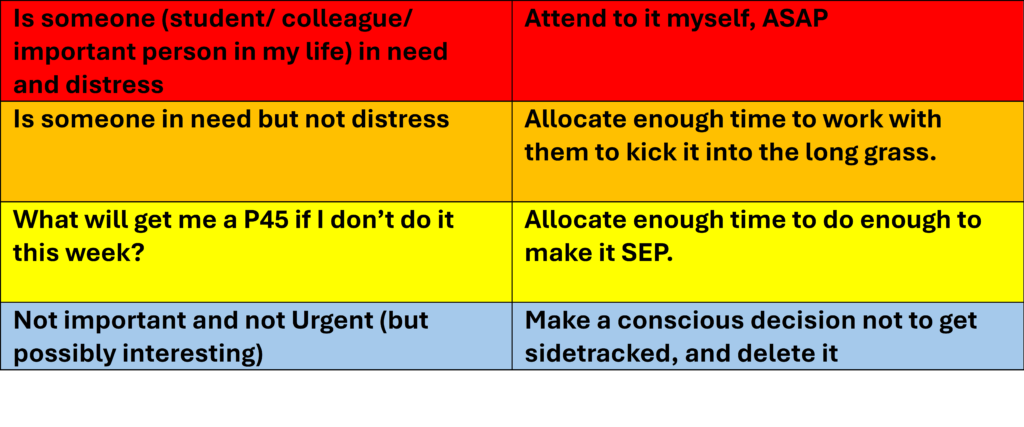Working Effectively – Learn to Sweat The Small Stuff

Friday 1st November
As a self-confessed control freak, I have spent much of my adult life learning not to sweat the small stuff and using my own rag-rated version of the Eisenhower matrix to prioritise my time…..

The RAG-rated Eisenhower Matrix.

As a busy parent with an often-absent-with-work spouse, young children, elderly parents and in-laws and a FT job, I spent quite a lot of the time that I was on my research journeys combining the proactive organisation of my studies with reacting to the vicissitudes of my personal and professional life that the foregoing combination bought with it. My mindset always used to be that I needed a significant tranche of time to make any progress with my studies, and that it wasn’t possible to make any meaningful progress in blocks of time any less than two hours. And because that’s what I believed, that’s how it was – because for a long time, I didn’t challenge that assumption. It was my assumption, based on my experience – so why would I challenge it? So when something happened (accident/illness of a family member, for example), I’d mourn my lost study time, and sometimes end up behind my planned curve.
As my job began to focus exclusively on working with Postgraduate students, some of whom were part-time, I began to hear many reasons for delay in deliverables from students that echoed my own, and some of those reasons related to inability to change previous study practices because “the way I’ve always done it works the best for me”. I had on PGCE PCET student, who was a Commander in the Royal navy, who would always explain his delays in terms of having to deal with the “crocodiles closest to his canoe”. So, the RAG-rated Eisenhower matrix morphed into the RAG-rated crocodiles closest to my canoe.
RAG-rated Crocodiles Closest to my canoe.

Key
|
SEP |
Someone Else’s Problem. This means tasking someone to do something or requiring answers to questions. Beware of responses that don’t address questions, though. Make sure that you bat them right back. |
|
Delete |
Wash that thing right out of your hair. Delete it rather than park it permanently, otherwise it will be stay there, as prey for the Procrastination Monster (more about him in the next post) |
I would often counsel students to try to look at things through a slightly different lens=making minor changes rather than major ones (e.g. go to every other home football match rather than not go at all). As making use of small chunks of time seemed to be as much of a problem for me as it was for my own students, I decided that this was something that I needed to work on. So instead of making the statement “I can’t do anything with a spare half an hour”, I began to ask myself the question “What can I do in half an hour?”. And the answer was, as it happened, quite a lot. Some of the things that I leaned that I COULD do in half an hour are set our below.
- Check six references. Where I use a number, the number is arbitrary, and I know that it will vary depending on the complexity involved in each case. But you know what I’m saying here. Spend your half hour checking references. If you only manage one reference, that’s a result. If you manage more than one, you’ve smashed it!
- Proofread (a number of) small sections of text.
- Make a note of some personal reflections on what you are working on at the moment (e.g., what went well in a particular tranche of data collection? What learning can I take from it? Were there any issues? How am I going to address them).
- Read (part of) a journal article. This might require some forethought, depending on your reading preferences. I have never been a great screen reader, and I’m much happier with a paper copy and a highlighter in my hand, so I always had to make sure that I had a journal article and a highlighter in my bag at all times. If you’re a screen reader, your forward planning might be downloading articles or checking that there will be adequate wi-fi where you think that you are going.
- Address at least one item of feedback on a piece of draft writing. This is another tip that is “elastic”, because exactly how much you can get done in a short space of time will depend on the complexity of the feedback.
- Re-visit/ review your time plan for the rest of the month.
This isn’t – and isn’t intended to be an exhaustive list. At the moment, you’ll just have to take my word for it that the more I discovered the art of the possible, the more things that I could usefully do in a short space of time. My learning was simply this – by looking at small units of time through a slightly different lens, my mind was opened up to possibilities that I simply hadn’t acknowledged before, because I had closed my mind to things that weren’t congruent with my existing modus operandi. I knew that things would have to be different whilst doing a doctorate alongside life and a FT job as a senior lecturer, but sometimes it was easier to stay in my comfort zone and find reasons (excuses) for what I hadn’t done rather than stepping out of my comfort zone, taking the plunge, and just having a go. When I stopped making excuses, and just had a go, it wasn’t half as challenging as I had previously made up my mind that it was going to be.






Responses